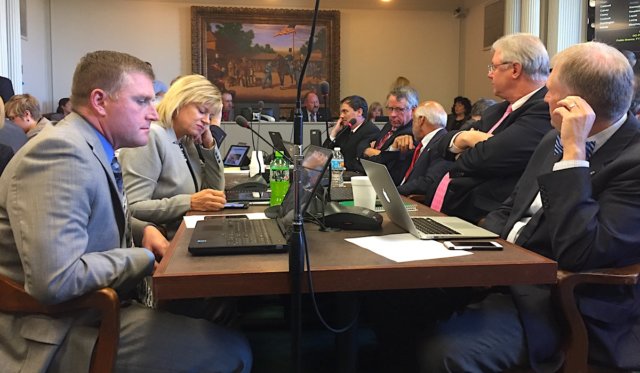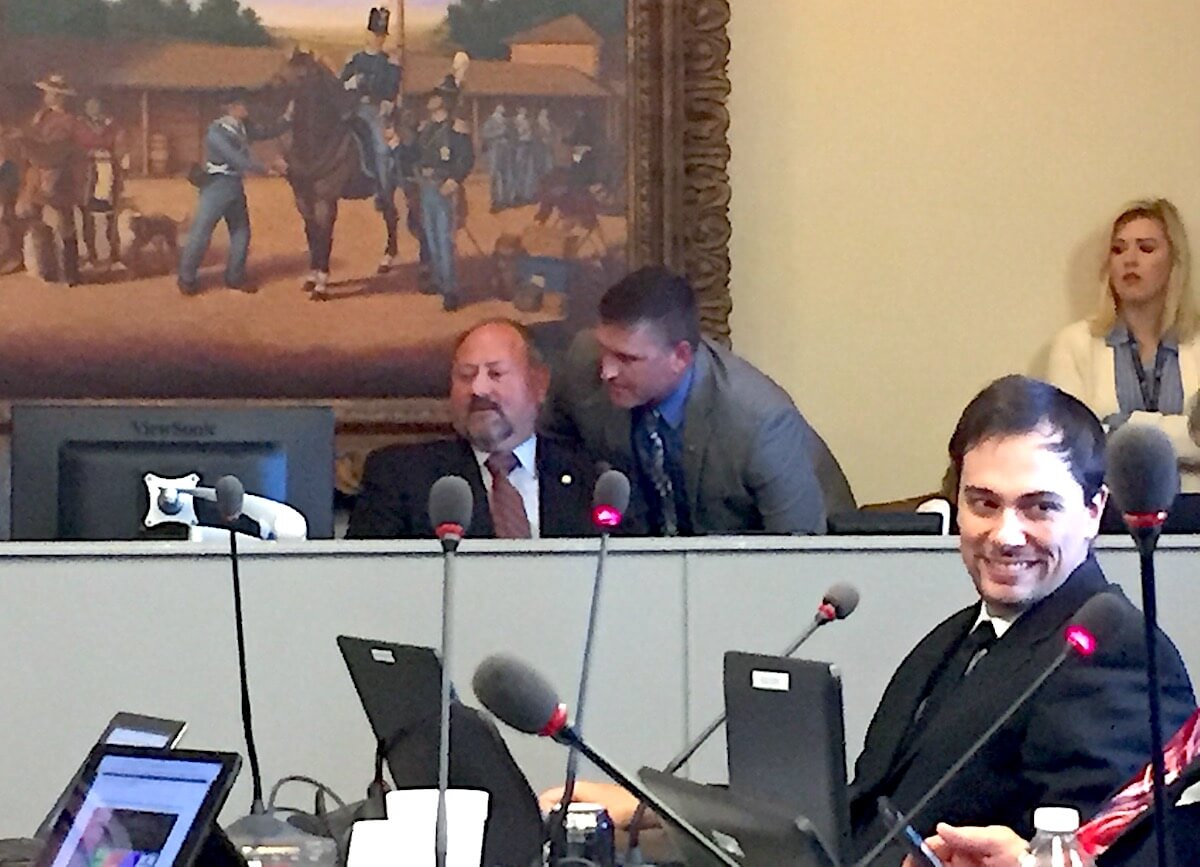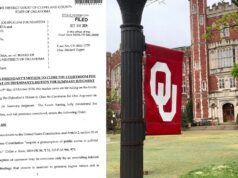
As Oklahoma House Republican leaders prepared for a Friday committee vote on the compromise revenue package that included an oil-industry tax hike, they cobbled together a series of events that could prevent the bill from advancing. All they needed was one mainstay of the 2017 Legislature to hold: that a majority of House Democrats would vote no on new revenue.
In the end, House Joint Committee on Appropriations and Budget Chairman Kevin Wallace (R-Wellston) and Assistant Majority Floor Leader Chris Kannady (R-OKC) held their water and declined to press the cartoonish green or red buttons on their laptops, functionally “walking” the vote while sitting on their keisters.
With only one Democrat supporting and five Democrats opposing, Wallace and Republicans called the vote at 11-11. As such, the best hope Oklahomans had to stave off state agency cuts and raise teacher pay vanished as quickly as it had appeared Thursday.
Walking into a House GOP Caucus meeting after the vote, Wallace and Kannady used Democrats’ opposition as cover for not voting.
“As you saw in committee, only one of the Ds was willing to support the measure,” Wallace said “With that ratio, if they won’t vote it out of committee with us, it will die on the floor.”
Kannady, who had briefly left his seat to confer with Wallace before the tie vote was called, did the same.
“I voted for every revenue-raising measure that’s been on the board this year. They haven’t,” Kannady said. “There was one (Democrat) on the board. We need them to pass it. They’ve got to have courage to pass it, too. That’s all I’m going to say.”

Accidental bipartisanship?
With those talking points floating around a lobbyist-filled yet public-devoid Capitol, Republicans adjourned the JCAB meeting by email and left Democrats standing outside the conference room to answer increasingly tough questions from the press.
Why had this bill — the year’s first chance to raise the gross production tax rate and earn the 76 House votes required of revenue measures — stalled? Was it the Democrats’ opposition? Was it the Republicans’?
Or, quite possibly, could it accidentally have been Oklahoma’s biggest bipartisan agreement of 2017?
Ahead of the 2018 election cycle, it would seem, each party had more to lose by taking a floor vote on the revenue package than it had to gain. At that point, common Oklahomans lost while political motivations won. Here’s how.
The death of taxes in the Oklahoma House
With helping (praise) hands from the Christian right, Republicans took over Oklahoma politics in the 2000s with water carried for and financial assistance received from state and national corporate interests, particularly oil and gas.
Anyone needing a primer on that notion can watch this 2015 American Legislative Exchange Council (ALEC) interview with current House Speaker Pro Tempore Harold Wright (R-Weatherford).
“Our revenue is up,” Wright told ALEC’s “happy warrior” Travis Brown. “I think that probably without the tax cuts, our economy might not be as good as it actually is.”
What a difference two years will make. Wednesday, Wright joined 53 of his Republican colleagues in voting yes on hundreds of millions of dollars in new taxes on tobacco, fuel and beer. But while he could have been summoned to break Friday’s 11-11 committee tie, GOP leaders did not beckon the representative, who will likely earn his final legislative term in the 2018 election.
A deal neither party wanted
In an Oklahoma political climate highlighted by abject and bipartisan frustration from Boise City to Broken Bow, perhaps it makes callous sense for Republican House leaders to find any excuse not to vote on a compromise revenue bill that includes a GPT increase. Other than petroleum interests, who could fund political action committees and independent expenditures to support the Republican Caucus in 2018 campaigns? (Hint: It won’t be the repeatedly spurned hospitals or education groups.)
While GOP House leaders may feign bewilderment around media and the public, why would they cut their noses off to spite their faces when Democrats signaled an unwillingness to support a bill that would jeopardize GOP campaign cash flow?
That would seem especially true when considering the long-term interests of Republican leadership’s vexing opponents. Compromising on a revenue package might unravel the political momentum Democrats have built with GPT as a new wedge issue. Toss in a $3,000 teacher pay raise on which Republicans could campaign, and Oklahomans have all the evidence they need to realize “compromising for the good of the state” was not in the best political interest of either Democrats or Republicans.
That, sadly, is the pathetic portrait Friday’s affair painted, and the silence of GOP and Democrat political leaders underwrote the artist’s descriptions.
Instead of touting the Senate’s bipartisan proposal and urging House Republican action, Gov. Mary Fallin spent the week cutting ribbons, dedicating bridges and touring warehouses.
Powerful state Democrats wanted nothing to do with discussing “compromise,” either. Through a campaign spokesperson, 2018 Democratic gubernatorial frontrunner Drew Edmondson declined comment ahead of Friday’s vote because he was “not privy to the details.” He spent the week tweeting blurry pictures of himself across rural Oklahoma.
OU President and former Gov. David Boren also “preferred not to comment,” according to his press secretary. Even Tulsa oil mogul and key Democratic backer George Kaiser did not want to discuss the Senate’s bipartisan proposal with NonDoc.
Just how artfully lawmakers will put a bullet in this fruitless special session remains to be seen, but state health agencies and many public programs will likely see further cuts.
That means House Republicans and House Democrats will have unwittingly paid political lip service to the notion of “working together.”
Friday’s debacle proved they can do exactly that, just not for the good of the state.





















